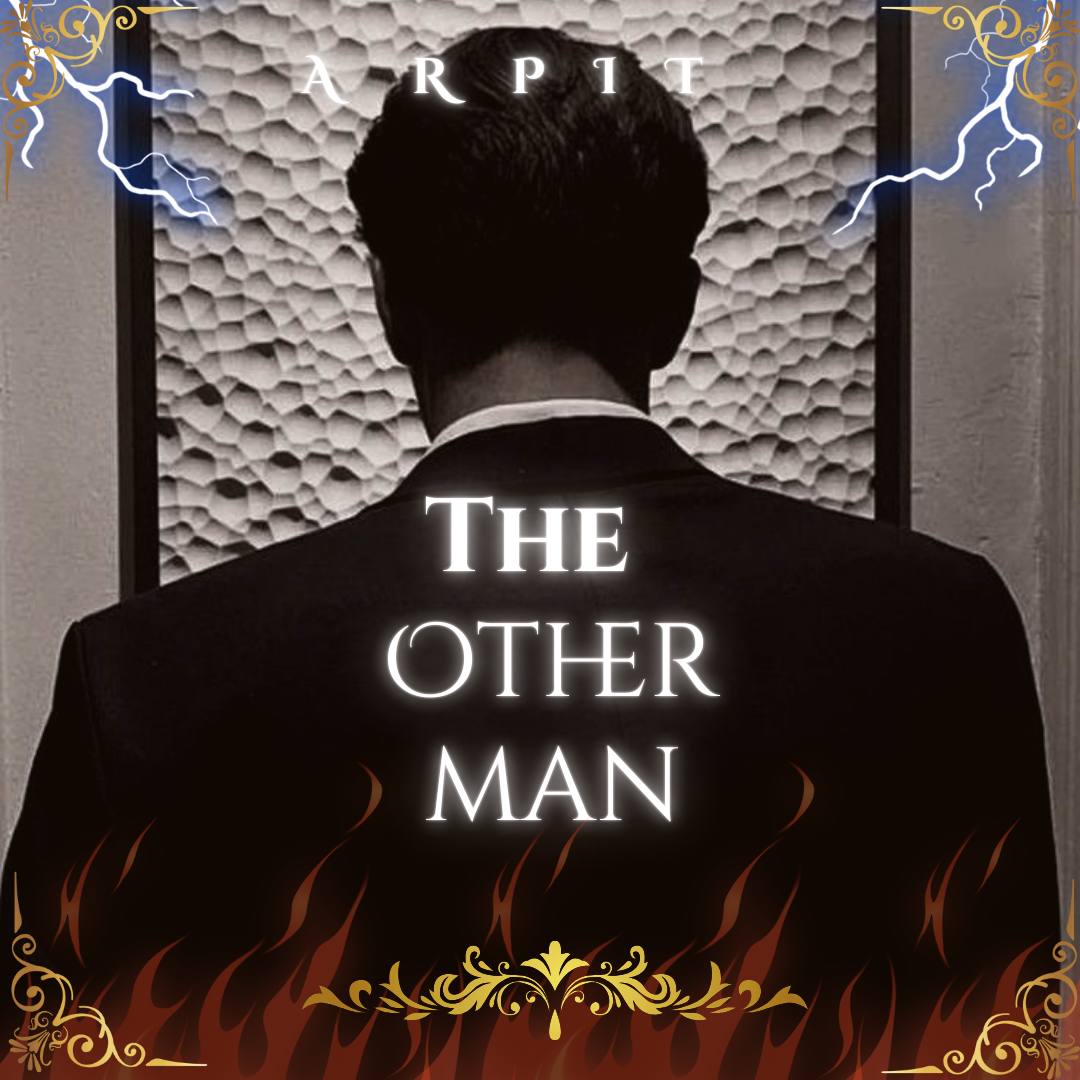
The Next Morning
The penthouse was unusually quiet—no storm, no slammed doors, no sharp words floating in the air. Just the soft clinking of cups in the kitchen and the faint hum of city traffic far below.
Shree stood by the stove, stirring two cups of chai. The fragrance of cardamom and ginger curled through the morning light.
She didn’t turn when she heard his footsteps. But she smiled—just slightly.
Tanishk walked in, dressed neatly. White linen shirt, sleeves rolled up, watch fastened like he was trying to anchor himself to something solid. There was calm on his face.
But in his eyes?
A flicker of restlessness. Nerves. A quiet storm still brewing behind the stillness.
Shree handed him a cup without a word.
He took it with a smile. “Thanks, Shree.”
She finally looked at him, her gaze lingering on the way his collar was buttoned just a little too tight, the way he kept glancing at the clock like time was daring him to go back.
“You’re going somewhere,” she said, softly.
Tanishk paused, then gave a slow nod. “I’m going to the mansion.”
She didn’t need to ask which one.
Shree looked down at her chai for a moment, then up at him again—eyes clear, steady.
“You’re going to meet her,” she said. It wasn’t a question. She already knew.
Tanishk exhaled, slowly. “I’m going to hear her. Really hear her this time. No shouting. No assumptions.”
His voice was quiet, but it held weight. Like he was speaking something aloud for the first time—even to himself.
Shree’s smile was small but warm. “You’ve taken a good step, Sahib.”
She stirred her tea again, then added gently, “Sometimes… we’re so blinded by our own pain and anger, we forget to look behind the curtain. Forget to ask what the other person was protecting.”
Tanishk sipped his chai in silence, her words settling over him like morning mist.
“Maybe,” he said after a moment, “it’s time I stop rewriting the story in my head and finally hear the one she never got to tell.”
Shree nodded, eyes soft with something like quiet pride. “Truth doesn’t hide. We just have to be brave enough to face it.”
Tanishk met her gaze.
And for the first time in a long time, he felt like he was doing something right—not for appearances, not for family, not for tradition.
For himself.
And for her.
He set the cup down gently.
“I won’t be long.”
Shree stepped aside, watching as he made his way to the door.
“Take your time,” she said, just before he left.
“Some truths are worth hearing slowly.”
Outside, the sun had finally broken through the clouds.
And for the first time in years, Tanishk Chandravanshi wasn’t running away from the past.
He was walking straight into it.
To face the girl he once loved.
The woman he never stopped.
The grand chandelier above the Chandravanshi foyer glittered silently, its crystals catching the morning light as if trying to soften the tension that came with unexpected arrivals.
Tanishk stepped into the estate slowly, his footsteps echoing off marble and memory. Everything looked the same—but felt different.
He hadn’t been here in months.
Years, emotionally.
So when Malini Devi, seated on the velvet couch with a book in hand, saw her son cross the threshold, her fingers froze on the page.
Her gaze lifted, sharp and searching.
“Tanishk?” she said, surprised but composed. “You’ve come.”
He nodded once, offering no pleasantries.
Malini’s eyes narrowed slightly. He never visited unless it was urgent. Or forced.
“What’s the matter?” she asked, voice careful.
Tanishk stood in silence for a second. Then, calmly—too calmly—he spoke:
“Where’s Kashish?”
The book slipped slightly from her hands.
Malini Devi blinked. “Kashish?”
He nodded.
Something flickered across her face—a mix of surprise, suspicion, and something almost… hopeful. He never asked about her. Not once.
And now, here he was. Asking like it mattered.
“She’s…” Malini began, but her voice trailed off as she turned toward the hallway—just in time.
Kashish was stepping out of the kitchen.
A brass plate in her hands, lined with fresh pakoras and a small bowl of green chutney.
She wore a soft cotton saree, the border stained faintly with turmeric. A few strands of hair clung to her cheek from the kitchen heat, and the gold bangles on her wrist clinked softly as she moved.
Despite the mansion full of maids and cooks, Malini Devi still preferred Kashish’s cooking. There was love in her hands—technique, yes, but also soul. She had once been offered positions at five-star hotels and gourmet kitchens.
But the Chandravanshi name came with rules.
Daughters-in-law didn’t work outside.
So she stayed.
And cooked.
And quietly watched life move on without her.
Kashish looked up—and froze.
There, by the main door, stood Tanishk.
Her breath caught. Just slightly.
The plate in her hand felt heavier.
Their eyes met, and time blurred.
She took a cautious step forward, placing the plate gently on the center table near Malini. Then, wordlessly, she turned to leave.
But his voice stopped her.
“I want to talk to you. Come with me.”
The words were simple.
But the air shifted.
Kashish looked at Malini Devi, eyes wide with silent questions. Should I? Why now? What changed?
Malini Devi, equally stunned, held her gaze—and then gave a small nod.
Permission. Or perhaps curiosity.
Tanishk was already walking toward his old study.
Kashish hesitated only for a second longer, then followed—her steps steady, her heart not.
Behind them, Malini Devi sat still, staring at the pakoras Kashish had just made. The scent rose in the air, warm and familiar.
But the moment had changed.
This wasn’t just food.
This wasn’t just a visit.
Something deeper had finally begun to stir between two people who had once meant the world to each other—and who had, maybe, just maybe, come to ask if any of that still remained.
Kashish stood still, her gaze lowered.
The truth sat heavy on her tongue, burning to be spoken — but it remained trapped. Bound by her father's stern warning. Bound by the quiet vow she made to herself:
Never tarnish the man Tanishk still looks up to.
She lifted her eyes to meet his, but the moment had shifted.
Tanishk was waiting.
“Say it,” he urged, voice tense. “Whatever it is… just say it, Kashish.”
Her breath trembled in her chest.
And then — quietly, firmly — she said,
“I can’t.”
His brow furrowed. “Can’t or won’t?”
She hesitated. Then repeated, even more softly,
“I can’t.”
That one sentence snapped something inside him.
He stepped back like her words had struck him.
“You dragged me here for this?” he asked bitterly. “After all these years, all the silence, all the confusion—you finally had a chance to tell me the truth, and you still won’t?”
Kashish's lips parted, but no words came. What could she say? That her father — the man Tanishk revered — had forced her hand? That her father in law told her not to tell him the reason.?
Iast night he came at told Kashish not to say anything ,Kashish was shocked thst how he knows about that night but Akhand told her, her father told him everything.
No. She wouldn't tear down her father in his eyes. She wouldn’t give him another person to hate.
“Tanishk, please—”
“No,” he cut in, sharp now, eyes blazing. “You don’t get to ask for understanding without giving any honesty.”
He turned away, jaw tight, fists clenched.
“I thought this meant something. That you wanted to clear the air. But you’re still playing the same game — hiding everything but us.”
Kashish’s throat tightened. Her hands trembled, but she stayed quiet.
Tanishk walked to the door, hand already on the knob. He paused for just a second, as if hoping she'd stop him — say something.
But she didn’t.
And that silence?
It was louder than anything else.
“Goodbye, Kashish,” he said coldly.
Then he opened the door and walked out.
Kashish remained frozen in the study, her heart pounding, her breath shallow.
Outside, the heavy door of the estate slammed shut behind him.
And just like that — he was gone again.
This time not because of pride.
But because the one person he came to hear… refused to speak.
The scent of fresh parathas, ghee, and cardamom chai floated through the marble corridors as the household staff laid out breakfast with practiced precision.
Malini Devi, now seated at the long dining table, adjusted her dupatta and glanced at the ornate clock on the wall.She saw him passing by near.
She called out, tone casual but laced with command:
“Tanishk! Come for breakfast, beta. It’ll get cold.”
Her voice echoed down the hallway, firm and familiar.
From the far end of the corridor, Tanishk appeared.
His face was unreadable—carefully neutral, like a man wearing an emotional mask stitched overnight.
Behind him, Kashish descended the stairs slowly, her saree rustling faintly with every step. Her expression mirrored his—calm on the surface, chaos beneath.
Malini smiled faintly, unaware of the storm that had passed just minutes ago inside the study.
“Sit, both of you,” she said, gesturing to their usual seats. “I had cook make your favorite—aloo methi paratha. And Kashish made the chutney herself.”
Tanishk hesitated for half a second.
Then, he nodded silently and pulled out his chair.
Not because he was hungry.
Not because he had forgiven.
But because upsetting Malini Devi right now would be another battle—and he didn’t have the strength for one more war today.
Kashish sat opposite him.
She didn’t look up. Neither did he.
Their hands reached for the same jug of water at the same time.
They both paused.
A flicker of eye contact.
A silence that screamed of unfinished conversations.
But neither spoke.
Malini Devi, oblivious to the weight between them, smiled as she sipped her tea.
“It feels nice. Like old times,” she said. “Both of you at the table again.”
Neither responded.
And yet, they stayed.
Because sometimes, love for a parent was stronger than the wounds between two people.
Even when that love held them in place like prisoners in their own silence.
The clink of cutlery and the occasional sound of water being poured were the only things filling the air.
Tanishk was eating mechanically — chewing, swallowing, but not tasting.
Kashish sat across from him, picking at her paratha like it was just another chore to get through.
And Malini Devi noticed.
She always noticed.
At first, she said nothing. Let the silence stretch. Let the small talk die on her tongue.
But when her son didn’t ask for seconds — he always asked for seconds — and Kashish didn’t once comment on how light the chutney had turned out — she always did — something in Malini’s eyes shifted.
She set her cup down.
And then asked, casually, but with undertones too sharp to miss:
“Everything alright?”
Tanishk didn’t look up. “Yeah.”
Kashish managed a faint smile. “Yes, Maa sa.”
Two answers. Both automatic. Both… off.
Malini’s fingers stilled on her spoon. She looked from one to the other — and saw everything they weren’t saying.
The space between them wasn’t just silence.
It was wounded silence.
And Malini Devi, matriarch of the Chandravanshi household, had lived long enough, ruled long enough, and mothered long enough to recognize when something had been broken — and left unrepaired for far too long.
Her voice was calm. But firmer now.
“Tanishk,” she said, her gaze fixed on him, “you came home after so long. And instead of speaking, you both sit like strangers at opposite ends of the table.”
“Did something happen?”
He finally looked up — and immediately regretted it.
Because a mother’s eyes were mirrors. And he saw his own frustration, confusion, and hurt reflected right back at him.
“No, Maa sa,” he said after a moment. “Nothing happened.”
Malini tilted her head.
Her voice softened, but her meaning was sharp as ever:
“That’s the problem, beta. Nothing is happening between you two. Not even words.”
She turned to Kashish, her eyes gentler now.
“And you…? You didn’t even look at him once.”
Kashish opened her mouth to speak — and then closed it again.
Because what was there to say?
That she’d broken his heart with silence again?
That the truth was a knot she couldn’t untangle — not without unraveling the very image Malini had of her husband, of the family?
She simply said:
“Some silences are safer than the truth, Maa sa.”
And that was the only answer she gave.
Malini Devi leaned back, her eyes narrowing just slightly.
She didn’t push.
Not now.
But she knew something had shifted — something deeper than a disagreement, more painful than a fight.
She would wait.
She always did.
But this time, she would start watching much closer.
Because something in her mother’s instinct whispered —
This silence isn’t just silence anymore. It’s distance. And it’s growing.
The quiet tension hung thick between them like a heavy curtain.
Malini Devi’s eyes shifted from Tanishk to Kashish, searching for answers neither offered.
Suddenly, breaking the silence, Malini’s voice rose—steady, yet filled with a subtle insistence:
“We want grandchildren soon! You’ve been married for three years. Doesn’t our heart also long to see our grandchildren, hmm?”
Her gaze was fixed firmly on her son.
Tanishk’s jaw tightened.
He slowly rose from his seat, his voice low but firm.
“Maa sa... it’s not possible.”
The room seemed to hold its breath.
Malini’s eyes snapped sharply toward Kashish.
But Kashish looked away, face flushed, silence deepening the space between them.
Malini’s tone softened but carried an unmistakable weight.
“Is that so?”
Neither spoke.
Tanishk’s shoulders squared. He glanced briefly at Kashish — a silent plea buried deep in his eyes — then turned away, his chair scraping lightly against the floor.
The air felt heavier than before.
And the unspoken truths lingered like a shadow — darker, more tangled, and impossible to ignore.
Later that evening
The soft glow of the evening lamp barely warmed the room, shadows pooling in the corners like unspoken fears.
Malini Devi stood by the window, her hands clasped tightly. She turned slowly to Kashish, her voice steady but sharp — the kind of tone that carried years of disappointment and unvoiced expectations.
“Kasish, tell me — why aren’t you working on this marriage? Why aren’t you stopping Tanishk from leaving the mansion, from walking away like this?”
She took a step closer, eyes narrowing.
“Isn’t it a wife’s duty to take care of her husband? To hold him, to keep him grounded? What kind of woman are you if you don’t know how to control your husband? If you let him slip away, you’ll lose him forever.”
Kashish stood silent, words caught like thorns in her throat.
What could she say?
That the man in front of her never truly saw her as a wife?
That their bond was a fragile thread stretched taut by rituals and ceremonies — but never stitched with love?
That beneath the surface, they were strangers bound by paper and tradition, not by heart?
She swallowed hard, eyes downcast.
Their marriage wasn’t the story of a couple building a life together.
It was the tale of two broken souls — once best friends, now lost to anger and sorrow.
The pure bond they once shared had cracked, splintered under the weight of unspoken grievances.
They fought — silently and loudly — but never healed.
And as Malini Devi’s words hung in the air, Kashish knew:
No defense could explain the emptiness between them.
No excuses could fill the growing distance.
Because sometimes, love wasn’t enough.
Later that night
The room was dark, save for the faint glow of streetlights filtering through the heavy curtains. Tanishk sat on the edge of his bed, his hands clenched tightly between his knees. The silence around him was suffocating — but inside, a storm raged.
His mind replayed every word, every glance from the day.
The silence in the breakfast room.
Malini Devi’s piercing questions.
Kashish’s downcast eyes.
The way she couldn’t—or wouldn’t—explain.
He hated the silence. It was heavier than any argument.
More painful than any shouted fight.
He wanted answers.
He wanted to understand why she had stayed silent all these years.
Why she had let everything fall apart without a single word.
But mostly, he was angry.
Angry that the woman he had once trusted more than anyone had shut him out.
That the friendship they had built since childhood was crumbling into dust.
He ran a hand through his hair, frustration twisting in his chest.
Whom she is protecting ?
Was she protecting herself?
Or was it all just... betrayal?
His breath hitched.
He hated feeling lost.
Hated feeling powerless.
He stood abruptly and paced the room, every step echoing his restless thoughts.
How do you fight when you don’t even know what you’re fighting for?
How do you hold on when the other hand is already letting go?
For a moment, his eyes glistened with unshed tears.
Then, with a bitter laugh, he sank back onto the bed.
The man who had stormed through the halls earlier was gone.
What remained was someone broken.
Alone.
And desperate for a way back — but unsure if the path still existed.










Write a comment ...